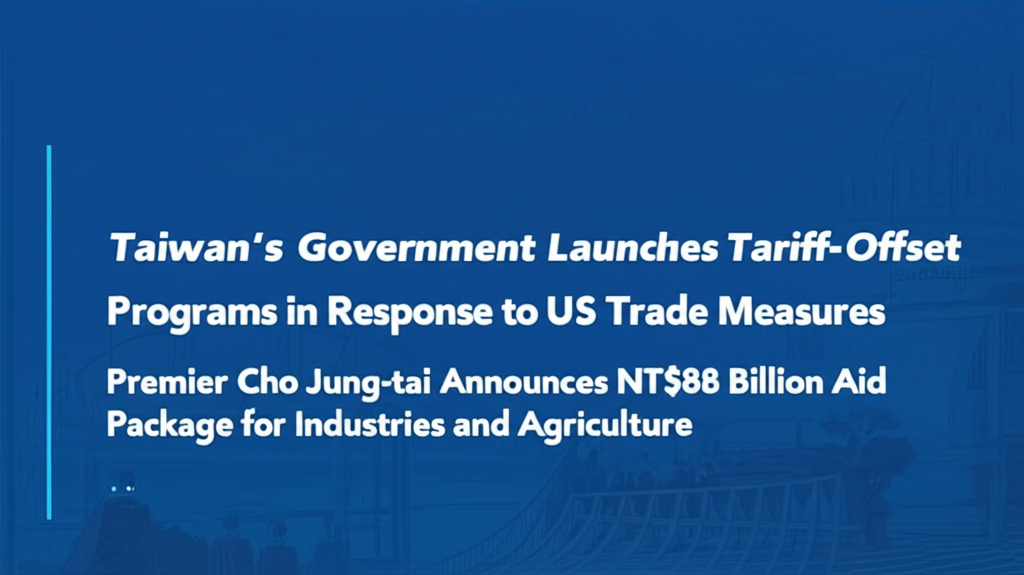Taiwan's Government Launches Tariff-Offset Programs in Response to US Trade Measures
Premier Cho Jung-tai Announces NT$88 Billion Aid Package for Industries and Agriculture

In a proactive move to support its economy, the Taiwanese Cabinet, led by Premier Cho Jung-tai (卓榮泰), has unveiled a comprehensive set of tariff-offset programs, allocating a substantial NT$88 billion (approximately US$2.66 billion) to aid both the industrial and agricultural sectors. This initiative comes in response to the latest US tariff policy impacting Taiwanese exports.
Premier Cho announced the government's strategic plans at a press conference in Taipei, following the US President's declaration of a 32% "reciprocal" tariff on Taiwanese imports. The government has devised 20 specific measures aimed at bolstering export supply chains and mitigating associated risks.
The industrial sector is slated to receive NT$70 billion, earmarked for offsetting administrative costs, enhancing industrial competitiveness, diversifying market reach, offering tax incentives, and stabilizing employment. The agricultural sector will benefit from an allocation of NT$18 billion.
“The Cabinet’s Trade Negotiations Office would continue to negotiate with the US government to bolster reasonable, favorable and reciprocally beneficial economic and trade relations,” Cho said.
“The Ministry of Economic Affairs, the Ministry of Finance and the Ministry of Labor should promptly put forward details about the 20 measures for people and industries to follow,” he added. To facilitate access to information, the government will establish 190 hotlines under affiliated agencies by Tuesday next week, providing comprehensive details on the new programs.
The government's assessment indicates that several key manufacturing areas will be significantly affected by the US tariffs, including electronics and information technology, steel and other metals, machinery, vehicles, and auto parts, building materials, and domestic appliances.
The agricultural and fisheries sectors, particularly exports of moth orchids, edamame, tea, tilapia, common dolphinfish, and sea bass, are also expected to face challenges, including potential market contraction and reduced competitiveness.
Acknowledging the dynamic nature of the US tariff policy and the anticipation of further details, the government will continue to closely monitor the situation, engaging with industries and the public to develop practical countermeasures, according to Premier Cho.
Vice Premier Cheng Li-chun (鄭麗君) highlighted that a Taiwan-US economic and trade task force, established in November last year, is already in place to monitor changes in US tariff policies, assess their impacts on various industries, and formulate corresponding strategies.
The government will also focus on developments in sectors such as semiconductors, pharmaceuticals, and timber, which were not covered in the initial US announcement, along with their implications for overseas Taiwanese businesses.
“Premier Cho has ordered agencies to announce the procedures and timelines by April 14 so industries could apply for the funding,” Cheng said, adding that the government would fully support the nation’s industries.
Minister Without Portfolio Jenni Yang (楊珍妮) emphasized the government's approach to negotiations with Washington, focusing on the complementary trade structure and the high-tech strategic partnership between Taiwan and the US to achieve a balanced trade relationship.
The government will also emphasize the US's trade surplus with Taiwan in agricultural products and suggest including that surplus in the calculation of reciprocal tariffs, she added.
When asked about the potential impact of a joint venture between Taiwan Semiconductor Manufacturing Co (台積電) and Intel on negotiations, Premier Cho affirmed that the focus would remain on safeguarding national interests.
Further details on this specific issue and its progress will be withheld, as the government will operate under the principle of prioritizing national interests.
